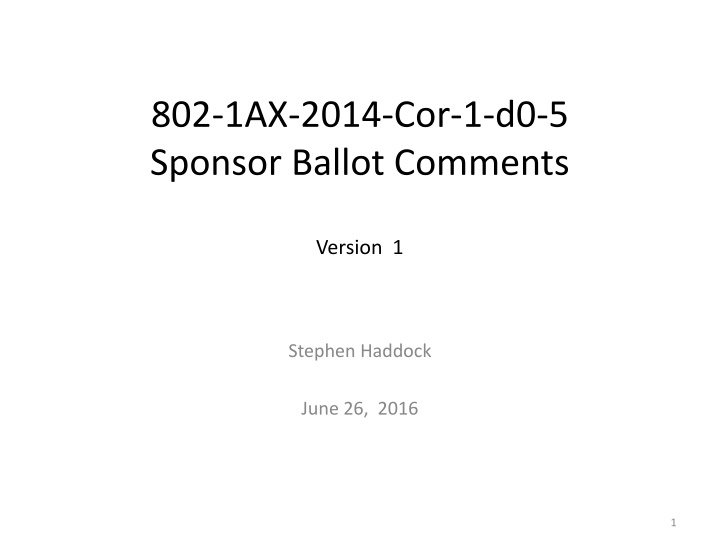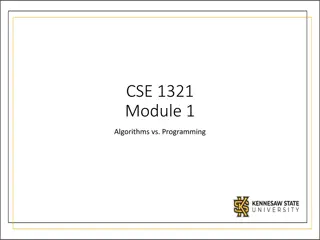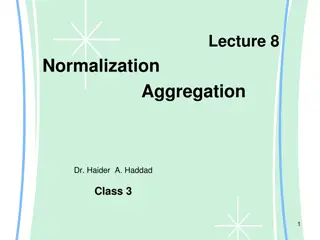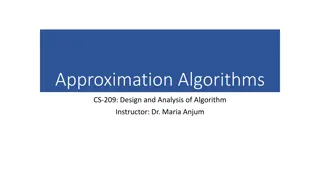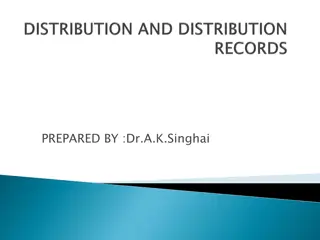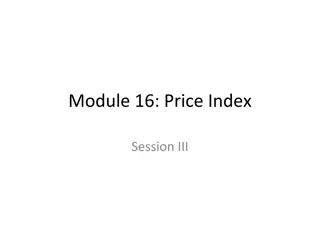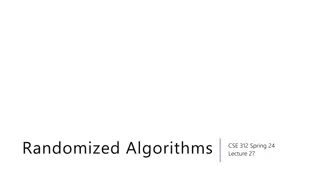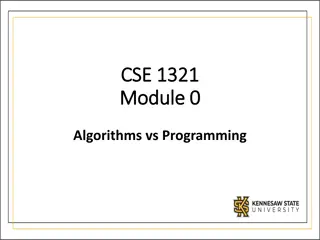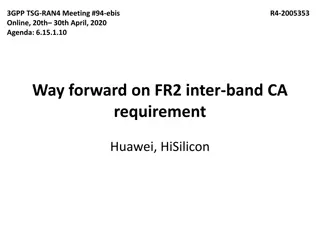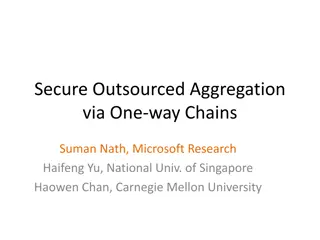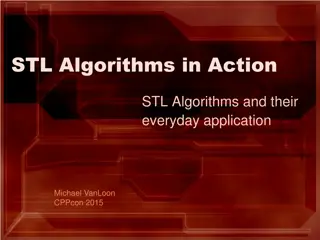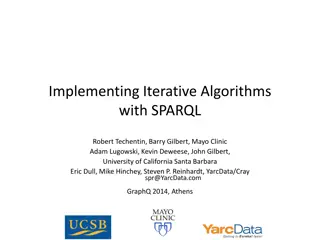Distribution Algorithms in Link Aggregation Groups
In the context of IEEE 802.1ax standard, the distribution algorithms for Link Aggregation Control Protocol (LACP) are explained. The standard allows for flexibility in choosing distribution algorithms, with version 2 enabling explicit coordination. The problem of per-Aggregator distribution algorithm variables is identified, proposing a solution using key variables for improved management. The concept of Port Algorithm, Conversation Service Mapping Digest, and Conversation LinkList Digest is also discussed in relation to distributing frames effectively in LAG configurations.
Download Presentation

Please find below an Image/Link to download the presentation.
The content on the website is provided AS IS for your information and personal use only. It may not be sold, licensed, or shared on other websites without obtaining consent from the author.If you encounter any issues during the download, it is possible that the publisher has removed the file from their server.
You are allowed to download the files provided on this website for personal or commercial use, subject to the condition that they are used lawfully. All files are the property of their respective owners.
The content on the website is provided AS IS for your information and personal use only. It may not be sold, licensed, or shared on other websites without obtaining consent from the author.
E N D
Presentation Transcript
802-1AX-2014-Cor-1-d0-5 Sponsor Ballot Comments Version 1 Stephen Haddock June 26, 2016 1
Comment I-2 Bridge BridgePort BridgePort BridgePort BridgePort When a Link Aggregation Group has multiple AggPorts, need to distribute transmit frames to the AggPorts and collect receive frames from the AggPorts Aggregator Aggregator Aggregator Aggregator AggPort AggPort AggPort AggPort MAC MAC MAC MAC
Distribution Algorithms LACP version 1: Distribution Algorithm unspecified Each system can use whatever distribution algorithm it wants. The collection algorithm will accept any packet from any Aggregation Port. Only constraint is that any sequence of packets that require order to be maintained must be distributed to the same Aggregation Port. LACP version 2: Allows specification and coordination of Distribution Algorithm Each Aggregation Port advertises in LACPDUs properties identifying the distribution algorithm it intends to use. When all ports in a Link Aggregation Group use the distribution algorithm, both systems can determine which link will be used for any given frame. Advantageous for traffic management and policing, CFM, etc.
Distribution Algorithm Variables Port_Algorithm Identifies which field(s) in frame will be used to distribute frames. E.g. C-VID, S-VID, I-SID, TE-SID, or UNSPECIFIED Conversation_Service_Mapping_Digest MD5 digest of a table that maps the Service ID (value in fields(s) identified by Port_Algorithm) to a 12-bit Port Conversation ID . Only necessary if Service ID is greater than 12-bits. Conversation_LinkList_Digest MD5 digest of a table that maps the 12-bit Port Conversation ID to a link in the LAG.
I-2: The problem Currently Distribution Algorithm variables are per-Aggregator. Different Aggregators can have different Distribution Algorithms. Bridge BridgePort BridgePort BridgePort BridgePort Aggregator Aggregator Aggregator Aggregator Currently if different Distribution Algorithm values are received on different ports, variables for the Partner Distribution Algorithm only store value of last link joined to LAG. AggPort AggPort AggPort AggPort Currently the values for the Distribution Algorithm variables sent in an LACPDU are undefined for a AggPort that is DETACHED from all Aggregators. MAC MAC MAC MAC
I-2: Proposed Solution Use key variables as a model The key variables have similar requirements. Per-AggPort Distribution Algorithm variables: Actor_Admin_... variables to send in LACPDUs. Partner_Admin_... variables to use as default when haven t heard from partner. Partner_Oper_... variables to store values received from partner. Per-Aggregator Distribution Algorithm variables: Actor_Oper_... variables. Equal to the AggPort Actor_Admin_... value if all AggPorts in LAG have the same value, otherwise default. Partner_Oper_... variables. Equal to the AggPort Partner_Oper_... value if all AggPorts in LAG have the same value, otherwise default.
Comment I-4 Discard_Wrong_Conversation (DWC) When the actor and partner are using the same Distribution Algorithm, each knows which link should be used for any given frame. DWC is a Boolean that controls whether to discard frames that are received on the wrong link. Protects against misordering of frames when a link is added or removed from the LAG without use of the Marker Protocol. Also protects against data loops in some DRNI corner cases. The Problem: DWC is set or cleared through management and is currently used whether or not actor and partner are using the same Distribution Algorithm. Results in total frame loss for some conversations. Proposed Solution: Make current variable an Admin_... variable. Add a Oper_DWC that takes the Admin_DWC value when actor and partner use the same Distribution Algorithm, and is false otherwise.
Comment I-3 Conversation Mask updates Once the Distribution Algorithm to be used on each LAG is determined, Boolean masks are created for each AggPort that specify whether a given Conversation ID is distributed (Port_Oper_Conversation_Mask) or collected (Collection_Conversation_Mask) on that AggPort. When the Collection_Conversation_Mask is updated, the specified processing assures that the bit for a given Conversation_ID is set to zero in the mask at all AggPorts before it is changed from zero to one at a single AggPort. This break-before-make operation prevents transient data loops, frame duplication, and frame mis-ordering.
I-3: Problem and Solution The Problem: The Port_Oper_Conversation_Mask is not updated using the same break- before-make processing as the Collection_Conversation_Mask. This can result in frame duplication if the bit for a given Conversation_ID is temporarily set for two AggPorts causing two copies of the frame to be sent, and the link delays are such that one frame arrives on the old link before the partner has updated it s collection mask, and the other frame arrives on the new link after the partner has updated it s collection mask. Proposed Solution: Use the same break-before-make processing for the Port_Oper_Conversation_Mask as the Collection_Conversation_Mask. This results in the two masks always having the same value, so could have just one mask. This would result in lots of editorial changes, however, so at this stage I would recommend against it.
Comment I-6 Port Conversation Mask TLVs The Port_Oper_Conversation_Mask is sent in version 2 LACPDUs in the Port Conversation Mask TLVs. This makes the LACPDU longer than the 128 byte fixed length for Slow Protocol PDUs. We worked around this by only sending these TLVs when the Boolean enable_long_pdu_xmit is set, and setting this when the received LACPDUs indicate the partner is running LACP version 2. The Problem: The received Port_Oper_Conversation_Mask is useful for debugging but is never used in LACP operation. Therefore it seems useful to be able to enable or disable it through management. Proposed Solution: Make enable_long_pdu_xmit a managed object. Only send long LACPDUs when this variable is set administratively and the partner is running LACP version 2.
Comment I-5 Wait-To-Recover (WTR) Timer Introduced in AX-Rev-d4.1 in response to comments from 802.1 participants, liaison questions from ITU, and a MEF requirements document requesting revertive and non-revertive behavior options when a link in a LAG goes down and comes back up.
I-5: The Problem(s) The Problem(s): 1. All timers in 802.1AX have units of seconds use a timer tick of 1s +- 250ms. The WTR Timer managed object is in units of minutes. 2. The managed object description says a value of 100 indicates non-revertive behavior, but nothing in the operational specification supports this. 3. The WTR Timer on an AggPort should be cleared (expire immediately) when all other AggPorts on the LAG are down, but this is not specified. When the timer is set to non-revertive (100) this means the timer will never expire and the AggPort will be down permanently. 4. While the WTR Timer is running, the actor will not include the link in frame distribution (and, if DWC is set, collection), but the partner may include the link in frame distribution and collection. If DWC is set, there will be total frame loss for all conversations mapping to this. In non- revertive mode this will go on indefinitely.
I-5: Proposed Solution(s) 1. In clause 7 and the MIB descriptions of aAggPortWTRTime change "value of 100" to "value greater than or equal to 32768", and modify the description to indicate the value is in units of seconds like all the other timers in the standard. Replace the first two sentences of the WTR_timer definition in 6.6.2.5 with "It provides for a delay between the time when Actor_oper_Port_State.Distributing changes from TRUE to FALSE and the time when that port can rejoin the LAG. The timer is started using the value aAggPortWTRTime (7.3.2.1.29), and is decremented every timer "tick" when the timer value is greater than zero and less than 32768. A value of zero provides revertive behavior (no-delay before the port can rejoin the LAG). A value greater than 32768 provides non- revertive behavior (port cannot rejoin the LAG unless it is the only port available). A value between zero and 32768 provides revertive-with- delay behavior." 2.
I-5: Proposed Solution (cont.) 3. Add to the Selection Logic that WTR_timer is set to zero when Ready_N is asserted and this port is the only port selected for the aggregator. Remove all mentions of WTR_timer from the description of ChangeActorOperDist (6.6.2.2) and updateConversationMask (6.6.2.4). Can only prevent the partner from including the link in frame distribution and collection by inhibiting the setting of Actor.Sync while the WTR Timer is running. Therefore change the Mux machines as shown in the following slide. (The independent control Mux machine is shown. Analogous changes required in the coupled control Mux machine.) 4.
Actor.Sync = FALSE; (Selected == SELECTED) && (WTR_Timer != 0) && (WTR_Timer == 0) && (WTR_Timer == 0) Start WTR_Timer in Disable_Distributing() if Distributing == TRUE && (WTR_Timer == 0) || (WTR_Timer != 0)
